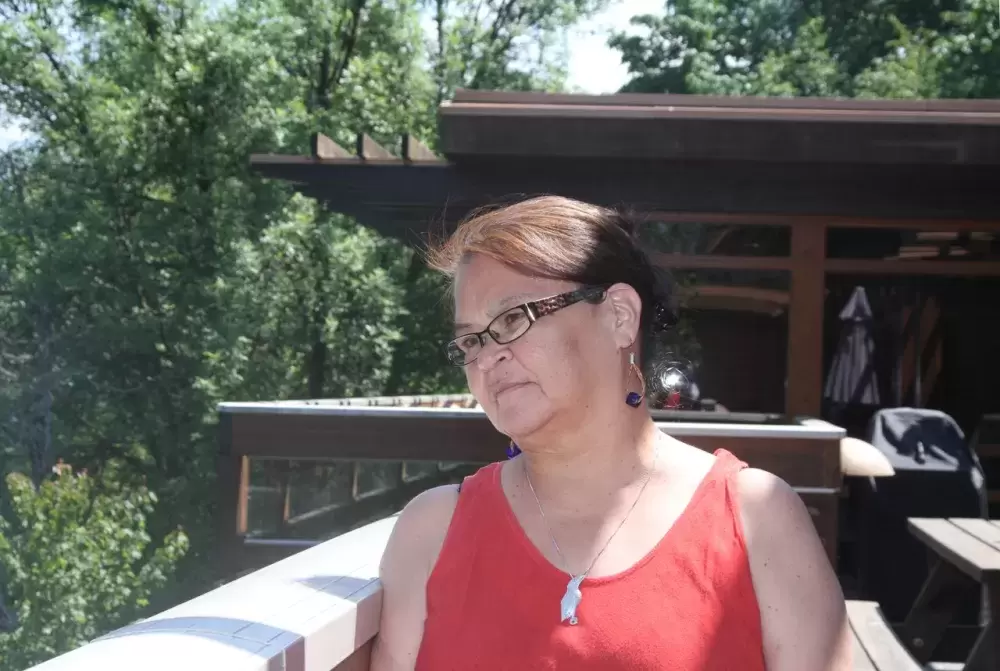The effects of British Columbia’s ongoing opioid crisis can be seen on Port Alberni’s 3rd Avenue, where a steady stream of drug users frequent the city’s safe injection site. Since opening in May 2017, the facility has seen an average of 35 visits each day during daytime operating hours.
Although the site is seen as a life-saver by many after no fatal overdoses have occurred at the location over the last two years, a recovering addict cautions that users need far more than clinical supervision to eventually overcome the grip of drug dependency.
Rita Watts is marking six years of sobriety after a preceding 22 of crack-cocaine use. She believes what drug addicts most need is a shoulder of support.
“After being clean, I hate it, I hate the drug, and I’m happy and proud of myself,” said the Hupacasath member, who was the guest speaker at the Honouring You Paths to Recovery event, organized by Teechuktl Mental Health staff at the Tseshaht administrative building on May 27.
Watts clearly remembers her first encounter with crack 28 years ago, when she came home to find her cousin and a former partner smoking from a can.
“I said, ‘What are you doing stupid?’ I hit it out of his mouth, out of his hand,” she recollected. “My cousin got very upset at me and he just picked it up and said, ‘Here try some.’ He put it at my mouth and lit it, and that was the end of it.”
A three-day binge followed for the three, then an ensuing transformation for Watts as she rarely took her mind off of the drug.
“The only thing that’s on your mind is, I’ve got to save enough, I can’t buy too much groceries because I’m not going to have enough,” said Watts of her preference for crack over food. “When I first started I was probably about 150 pounds. In one month, two months, I went down to 100 pounds because you don’t eat. You don’t think about nothing but, there is nothing more important than your next high.”
Watts was continually short on money over her years of drug use, facing cut-off hydro, cable and home eviction. She borrowed from anyone willing as she desperately fed her addiction to crack-cocaine.
“It takes control of your mind, it takes control of your feelings,” she said. “You don’t eat, you don’t sleep, all you do is drink water. Some people can drink alcohol, and some people can eat, but I never did.”
Illicit drug use has become increasingly lethal in the years since Watts stopped using, with the introduction of Fentanyl into street narcotics. Disturbing statistics released in late May show that overdose deaths continued to rise among First Nations in 2018, leading provincial health authorities to emphasize harm reduction measures like safe injection sites and Naloxone training as the best approach to curb the wave of deaths from illicit drug use. Last year the First Nations Health Authority provided $2.4 million in grants for harm reduction initiatives in 55 communities across B.C.
But it was a strike of tough love that Watts credits for pushing her away from the years of drug use. The ultimatum came from a former spouse who had previously enabled the habit by giving Watts money when she was desperate.
“I went home and he said, ‘I’ve had it Rita, I’m done. You go back there, you’re not going to be able to come back. I’m going to pack up your stuff and I’m bringing you to your mom’s’,” recalled Watts.
She did go back to her usual source at the notorious Frigstad Apartments, now the Harbourview. But her spouse followed through with his pledge.
“He was at the door, he changed the locks on me,” said Watts. “That was my turning point, he made me promise and plead that I would not go back.”
The long-time user began counselling, including visits to Teechuktl’s Quu’asa program.
“I started seeing myself, seeing the person that I was and the person I wanted to be,” said Watts. “But that person I wanted to be was so stuck in her addiction that it took four treatment centres to open my eyes.”
Her children have also struggled with drug addiction, and after undergoing treatment Watts was presented with a responsibility that she believes has helped to keep her accountable. For the last six years she has raised a grandchild, whom she took in as an infant.
“Me helping her, she helped me,” said Watts, who cares for two other young grandchildren as well. “If I didn’t have the responsibility, I don’t know that I’d be the person I am today. My responsibility is an everyday thing.”
For the grandmother, her life has become a chance to break an intergenerational cycle that goes back to when she was in foster care.
“I was a runaway. I didn’t want to be sexually abused by my foster parent,” she said, admitting that for years she blamed herself for exposing her children to drug use. “It wasn’t okay, and I know that now, but I didn’t know it then. I wasn’t taught.”
“Every day is a challenge, every day is another day,” continued Watts. “I never thought that I would love being sober, but I love it. I can think with a clear mind.”







